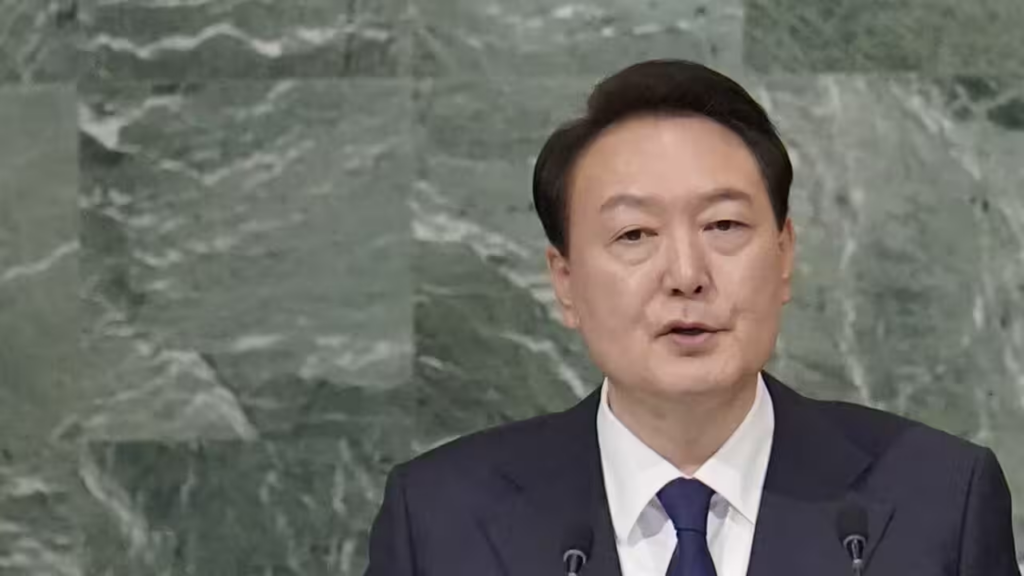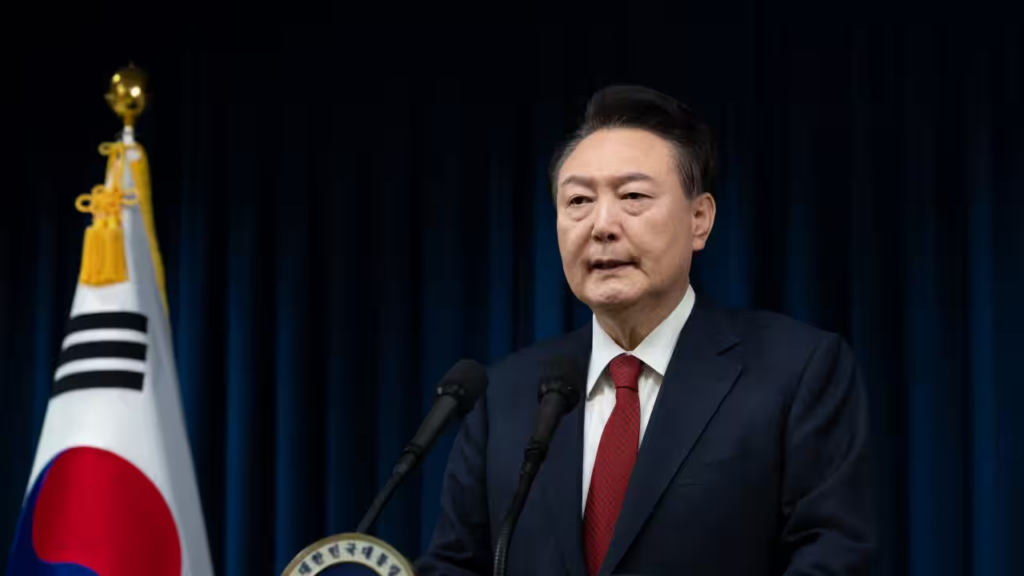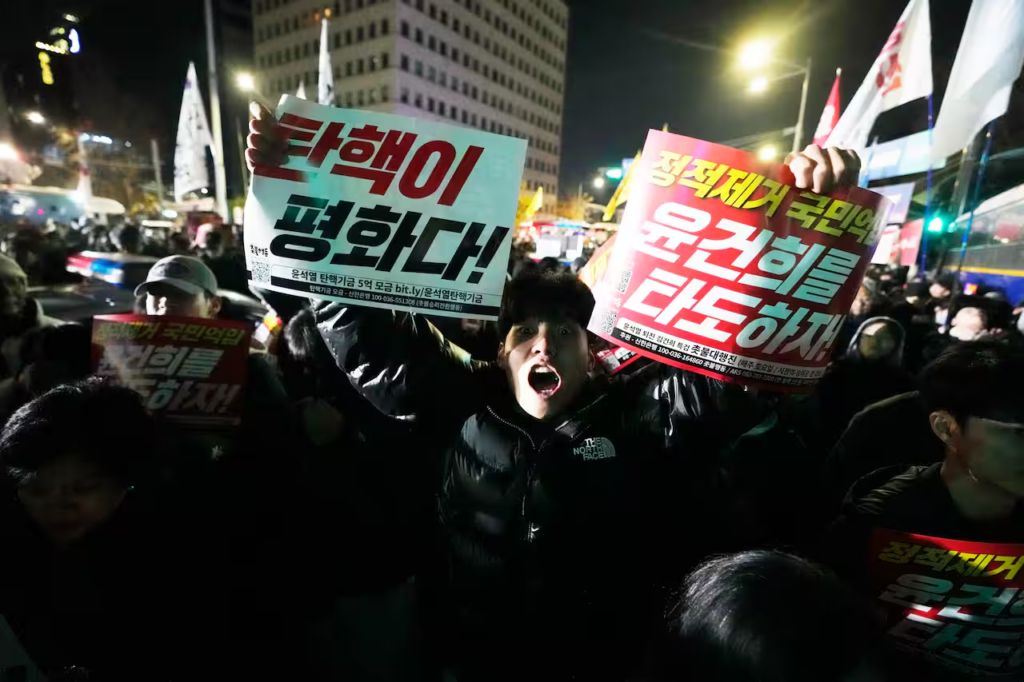Impeached President Faces Charges of Rebellion and Abuse of Authority
South Korean investigators are moving to arrest impeached President Yoon Suk Yeol. This unprecedented action follows his short-lived declaration of martial law earlier this month. The move plunged the nation into chaos, sparking political turmoil and economic instability.
The Corruption Investigation Office for High-Ranking Officials (CIO) is leading the investigation alongside police and military authorities. They are probing whether Yoon’s actions constitute rebellion and abuse of authority.

Arrest Warrant Request Amid Resistance
The CIO confirmed it has submitted a formal request for Yoon’s detention to the Seoul Western District Court. Investigators aim to compel the former president to cooperate after he repeatedly ignored calls to appear for questioning.
Yoon has also blocked searches of his offices, citing national security laws that protect military-linked locations from being seized without consent. His lawyers argue the warrant application lacks legal grounds.
Yoon Kab-keun, Yoon’s attorney, criticized the move, calling it “unjustified.” He emphasized that South Korean law protects sitting presidents from prosecution for abuse of power.
“The warrant does not meet the requirements under the Criminal Procedure Act,” the lawyer stated.
First Arrest Attempt for an Impeached President
If approved, this will mark the first attempt in South Korea’s history to detain a sitting president before the impeachment process is finalized. Yoon’s impeachment by the National Assembly on December 14 has already suspended his presidential powers.
The Constitutional Court is currently deliberating whether to uphold the impeachment, which would formally remove Yoon from office, or reinstate him.

Why Was Yoon Suk Yeol Impeached?
Yoon declared martial law on December 3, a decision that lasted only a few hours but sent shockwaves across the nation. This marked South Korea’s first martial law declaration in four decades.
The National Assembly voted to impeach Yoon over the move, accusing him of abusing his authority and endangering the nation’s democracy. Political tension has soared since the impeachment, with high-level diplomacy halted and financial markets shaken.
Yoon defended his actions, framing the martial law declaration as a necessary response to obstruction by the liberal Democratic Party. The opposition party holds a parliamentary majority and has blocked much of Yoon’s conservative agenda.
Criminal Charges Loom
Prosecutors have accused Yoon of orchestrating insurrection, a grave charge that carries penalties ranging from life imprisonment to the death penalty.
A leaked 10-page prosecutor’s report alleges Yoon authorized military forces to use weapons to enter parliament if necessary. This directive, part of his failed martial law bid, is central to the investigation.
Yoon’s legal team dismissed the report as biased and lacking credibility.
“This is a one-sided account that defies objective circumstances and common sense,” Yoon’s lawyer stated.
Political Instability Deepens
The impeachment has triggered a leadership vacuum. Prime Minister Han Duck-soo, who assumed acting presidential duties after Yoon’s suspension, was also impeached last week. Lawmakers accused him of delaying the appointment of three Constitutional Court judges critical to Yoon’s case.
South Korea’s current interim leader, Finance Minister Choi Sang-mok, faces mounting pressure to stabilize the government. The leadership crisis has paralyzed decision-making at a time of heightened tensions in the region.

What Happens Next?
The Seoul Western District Court will decide whether to issue the arrest warrant. Legal experts say it could take days or even weeks. If the warrant is granted, authorities face significant challenges in detaining Yoon.
Under South Korean law, military-linked sites cannot be accessed without approval from the person in charge. Yoon, still residing in a protected facility, is unlikely to leave voluntarily if faced with detainment.
Meanwhile, the Constitutional Court’s decision on Yoon’s impeachment will shape the nation’s political landscape for years. If the court upholds the impeachment, Yoon will be permanently removed from office, setting a historic precedent.
Public Reaction
The impeachment and potential arrest of Yoon Suk Yeol have deeply divided South Koreans. Critics argue Yoon’s martial law declaration was an authoritarian overreach. Supporters claim he acted out of necessity to counter legislative gridlock.
Mass protests have erupted across the country, with some demanding Yoon’s prosecution and others calling for his reinstatement. The political instability has eroded public trust in the government, leaving South Korea in a precarious position.
The investigation into Yoon Suk Yeol represents a pivotal moment in South Korea’s democracy. The outcome will not only determine Yoon’s fate but also set a precedent for the accountability of future leaders.
As the nation waits for the court’s decision on both the arrest warrant and impeachment, South Korea faces an uncertain road ahead. The political drama unfolding in Seoul is a stark reminder of the fragility of democratic institutions, even in established democracies.
Our Visitor






 Users Today : 12
Users Today : 12



